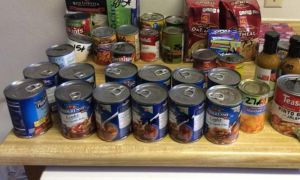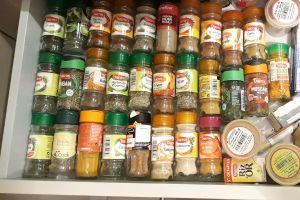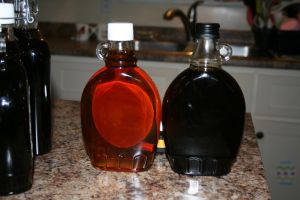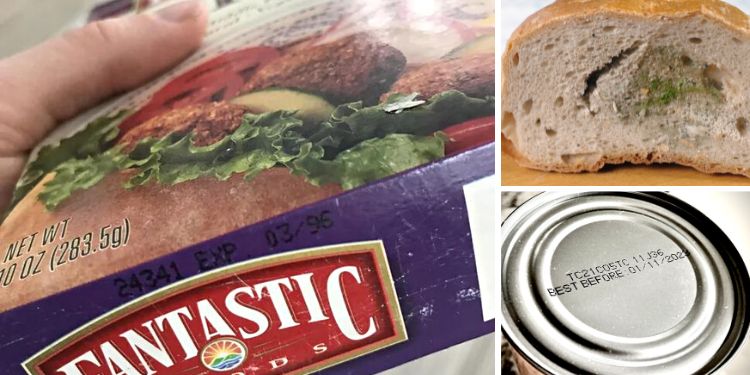Did you know that food makes up the biggest percentage of material deposited into landfills each year?
So much food gets discarded that according to the FDA, “food waste is estimated at being between 30–40 percent of the food supply.” Almost one-third of our global food supply is wasted each year.
Now, the purpose of this article is not to make folks feel bad about wasting food. However, if a food crisis or emergency hits, people won’t be tossing out as much food as before.
It will be important to know which foods you can safely consume past their expiration date, and which ones are a little more risky or should be thrown away.
In this article, we’ll discuss the different types of expiration dates on food products, a few examples of expired foods you can safely eat when SHTF, and how to tell if food is safe to eat after its expiration date.
Disclaimer:
While eating “expired” food probably doesn’t seem like the soundest advice, many so-called “expired” foods are actually perfectly safe to eat. According to the FDA:
“Manufacturers provide dating […on food packaging…] to help consumers and retailers decide when food is of best quality. Except for infant formula, dates are not an indicator of the product’s safety and are not required by Federal law.”
When consuming food that is “expired” or past its recommended date, please rely on your own best judgment. Always inspect food for noticeable changes in color, smell, and consistency before eating.
What Do The Dates On Your Food Really Mean?
Expiration dates on food are confusing. Most people believe that there’s a scientific explanation for the printed dates on their food. However, that’s not always exactly the case.
⇒ What Happens When You Take Expired Medications
As it turns out, predicting when food will still be “safe” to eat isn’t really an exact science because quality and freshness can depend on several factors.
Things like food quality, storage, and handling can affect the total shelf life. Knowing this, what exactly do all the different expiration dates mean?
“Use-by” :
“Use-by” dates are essentially a recommendation of “freshness”. It indicates when a product should be consumed to enjoy it at its tastiest. According to the manufacturer, the date printed on the label is the last day that the product is likely to maintain its “peak quality”.
Properly-stored food items have the potential to last for months to years beyond the printed date. (Infant formula is the only exception to this rule, which is the only food that has a federally regulated expiration “use-by” date.)
“Best-by” or “Best if Used by”:
“Best-by” dates are basically the same thing as “Use-by” or “Best if Used by” dates. So, if you eat food past this date, you’re more likely to run into quality issues than safety issues. If stored properly, these foods are typically safe to eat well past their “Best-by” date.
“Expires-on”:
“The “expiration” date is the last day the food is technically considered “fresh”. After that date, the chances of your food going rancid, or sour are likely to rise.
Food that is past its expiration date can still be eaten if you determine it as being safe to eat. However, if it has a sour smell, an off-color, a funky texture, or separating liquids, you’re probably better off throwing it away.
“Sell-by”:
The sell-by date is usually placed on food for inventory purposes. It tells the store how long to sell the food before removing it from shelves.
Food that has passed its “sell-by” date can be trickier to determine whether or not it’s safe to eat. So, it’s up to you to decide if it’s still “good” before eating.
Expired Foods That Are Generally Safe To Consume
Canned Foods
 When it comes to eating expired foods, canned items are likely to be your best bet in the long term.
When it comes to eating expired foods, canned items are likely to be your best bet in the long term.
This is because canned foods are pressurized and sealed using temperatures hot enough to kill most pathogens.
For this reason, the chances of contamination or spoilage are minimal if cans are handled and stored properly.
Related: 7 Mistakes You Are Making When Buying Canned Foods
In fact, there have been reports of people eating canned food as old as 100 years with no negative effects. However, when it comes to eating canned food that’s well-passed its expiration date, storage, and quality of ingredients are everything.
When to avoid “expired” canned food:
If cans of food have deep dents, are swelling, or have rust on them, it’s probably better to reject them unless you’re in a true “do-or-die” situation. Even then, always inspect the expired food before consuming it to determine for yourself whether or not it’s still safe to eat.
Additionally, some canned foods are more acidic and may “eat away” at the can’s inner lining over time. This can lead to food spoiling faster once the expiration date passes.
For this reason, preppers often keep a variety of low and high-acid canned foods in their stockpile. Always inspect the quality of the can and its contents before eating highly acidic expired canned food.
Dried/Powdered foods
 If storage conditions are right, unopened dried foods such as flour, powdered milk, salt, powdered peanut butter, sugar, dried spices, and powdered spices, etc., might still be perfectly safe to eat after their “expiration” date.
If storage conditions are right, unopened dried foods such as flour, powdered milk, salt, powdered peanut butter, sugar, dried spices, and powdered spices, etc., might still be perfectly safe to eat after their “expiration” date.
Related: How To Make A Meat Powder That Can Last 5 Years
Because of their ultra-low moisture content, they’re less susceptible to bacterial growth and can be kept in a cool, dry place for months to years after expiration.
It’s important to note that some dried and powdered foods that are “activated” like yeast, baking powder, and baking soda can become “inactive” or deteriorate in quality after the expiration date, especially once opened.
They can still be used after “expiring” – they just might not work as well. Unopened containers can be stored in the pantry or freezer for 2-3 years before quality is affected.
When to avoid “expired” dried foods:
Dried dairy products with low fat have the potential to last longer than products that don’t. So, full-fat powdered butter, peanut butter, or milk will start to go bad more quickly than non-fat-dried products.
Additionally, dried foods with already higher moisture or nutrient content, like brown sugar, whole wheat flours, and brown rice, may lose their nutritional density faster, but should still be just fine to eat if properly sealed and stored in a cool, dry place.
If dried dairy foods have signs of moisture, contamination, or other observable damage, consume them at your own risk.
Nuts
 Properly stored nuts can last for quite some time after the expiration date.
Properly stored nuts can last for quite some time after the expiration date.
Nuts of all varieties that are stored in a sealed, airtight container can be eaten up to 2-years beyond the printed date, in most cases. Some brave people have reported eating “expired” nuts that were even older than that!
As long as your nuts don’t show signs of spoilage or rancidity, you should be okay to eat them.
However, some sensitive individuals report minor stomach upset or temporary digestion problems from eating expired nuts. As with everything else on this list, consume expired nuts at your own risk.
When to avoid “expired” nuts:
Nuts tend to be high in fat which goes rancid over time. Before eating nuts past their expiration date, check for rancidity first.
If there are any signs of oiliness, excess moisture, or you notice a chemical or paint-like smell, you may want to consider eating a different food item if possible.
Bread
 As far as wheat based products go, crackers, cookies, and tortilla chips can all stretch well beyond their printed date if stored correctly. Bread, on the other hand, has a pretty limited shelf life, especially if you make it at home.
As far as wheat based products go, crackers, cookies, and tortilla chips can all stretch well beyond their printed date if stored correctly. Bread, on the other hand, has a pretty limited shelf life, especially if you make it at home.
Related: How To Make Bread Last For Up To 5 Years
Although bread may not be the best food item to keep in your stockpile long-term, you never know when stuff will “hit the fan” or when you’ll want to stretch your loaf of bread for longer than you originally needed to.
In this scenario, bread can last longer than you’d guess – About 1-2 weeks beyond the printed date for store-bought bread and 5-7 days for bread baked at home.
When to avoid “expired” bread:
Bread, even stale bread, can still be relatively safe to eat until it shows sign of mold or rancidity. Some folks simply cut off the moldy outside parts with a knife and eat the rest, like one might do with hard cheese.
However, the mold you see on the outside of bread could also be on the inside, so take caution when eating bread past its expiration date.
Eating less-than-perfect bread is something our ancestors likely did when times were rough. In modern times, old bread makes the best french toast, meatloaf, or bread pudding! Ultimately, the decision to eat expired foods is yours to make.
It’s important to note that there are many types of molds and fungi that can grow on moist foods like bread. Some molds and fungi are more dangerous than others and can sometimes cause symptoms like nausea, headaches, allergies, or other health problems.
Root Veggies
 Root vegetables are a great and nutritious food to have on hand. This is likely owed to how long they can stay fresh given the right conditions.
Root vegetables are a great and nutritious food to have on hand. This is likely owed to how long they can stay fresh given the right conditions.
Potatoes, beets, radishes, and other root veggies or tubers can be kept in a cool, dark place for several weeks unrefrigerated before they start to sprout.
The best way to store them is in a root cellar. If you don’t have one, here is a cheap and easy way to build a root cellar in your backyard.
When to avoid “expired” root veggies:
Unfortunately, these veggies don’t always look the prettiest on the outside. As a result, they tend to get tossed out pretty often even when they’re still fine to eat.
If your root veggies have large “mushy” spots, are leaking strange liquids, or smell “off”, by all means, throw them away!
However, if the root vegetable is still firm – but there are a few darker-hued dents, bruises, sprouts, or warts on the skin of your potatoes or beets – it’s probably still good to eat.
Simply skin away these parts with a potato peeler or knife, just like one might do with hard cheeses or loaves of bread. As long as it passes your quality check and you’ve determined it as being safe to eat, you’re probably safe to proceed.
Honey, Molasses, And Syrups
 When honey is sold in stores, it usually has a “Use By” date on the label.
When honey is sold in stores, it usually has a “Use By” date on the label.
But the thing about honey is that it never really expires.
Because of its low moisture content, there’s not a lot of room for microbial or bacterial growth.
Unless you expose the honey to moisture or some other contamination, honey has an almost limitless shelf life.
The same can be said for man-made sugary syrups like most types of maple syrup, pancake syrup, Karo syrup, or simple syrup. These food items have so much sugar in them that it keeps the contents more or less preserved indefinitely.
Well-kept syrups can last anywhere from months to years longer than what it says on the printed use-by or expiration date. You might notice changes like a darkening in color or crystallization overtime, but this is considered normal and still safe to consume in most cases.
When to avoid “expired” syrups:
Although sugar is responsible for giving syrups their longer shelf-lives, it is important to note that the quality of these products can decline over time once opened.
Since moisture and other contaminates can quickly compromise the quality of your syrups, store in a cool dry place with an air tight cap once opened.
Overtime, you may notice changes in color, consistency, and taste. Eventually, this can affect the overall quality of the product but that doesn’t seem to make people sick or deter people from using it.
However, if your syrup or honey smells foul or sour, it might have started fermenting. If this happens, you’ll want to throw it away!
Eating expired food might sound like an extreme measure, but it can be a lifesaver in certain situations. In a SHTF situation for example, expired food can provide much-needed energy and nutrition when other food sources are not available.
However, it is important to remember that expired food may not be as nutritious or safe as fresh food and should only be consumed if absolutely necessary.
With proper knowledge about how expiration dates work and what warning signs to look for, eating expired food can help you survive in the most difficult circumstances.
You may also like:
 These 10 Types of People Will Die First When SHTF
These 10 Types of People Will Die First When SHTF
How To Get 295 Pounds Of Extra Food For Just $5 A Week (Video)
11 Expensive Items That Used To Be Cheap















I buy yeast in bulk that has been packaged in mylar. I keep it in the freezer and it remains fresh for at least two years that way I’ve never had any that’s older than two years past the best buy date so I don’t know if it lasts longer than that! The yeast I buy and store this way is better than any yeast I have bought in small packages that are still within the best buy period!
I’ve had yeast past two years. The yeast I have now is a little over 3 years and it is not raising as as it is taking longer to proof (making a sponge) and so I will replace it.
Kicking myself for not mentioning yeast. Good tip! 🙂
Old sayings hold truths, the one that comes to mind here is “when in doubt, throw it out.”
Me and the guy’s I work with have all taken turns buying bulk bags of expired bread from the Local hostess bakery outlet store to feed the ducks we have here at work. One thing I noticed over the years is if you rip open the bags and let the bread dry out, it’ll last forever.. dry bread could be used in meat loaf, stuffing, soups even for a samich. It definitely hasn’t hurt the ducks any.
We do that as well. We don’t throw out old bread, just let it dry out. Can be used with your favorite spices to make salad croutons! If nothing else we feed it to the birds in the yard. Doesn’t seem to harm them.
Packaged foods don’t ‘expire’.
Dates on food in the US are not required by the FDA or the USDA. The only “food” that requires them is baby formula.
Freshness and tastiness are not related to safety, which this article didn’t really cover.
Use common sense. Waste not, want not.
Rancid/rotten meats, compromised canned goods, etc. are the things that will make you sick and/or kill you. An old cake mix, 10 year old dried beans or rice, an uncompromised can of tuna… not so much.
Mostly it takes common sense. If you leave a hunk of meat or something made with eggs out for several hours at room temperature there is a chance that you can get food poisoning. But a bowl of plain rice, bread, plain veggies… no so much. The microorganisms need to exist on the food to grow.
I’ve got some foods past its ‘best by’ date in my preps. I’m totally okay with slightly off food in a potential emergency, but I’ve go no desire to eat those unless there isn’t another option.
When I was in Vietnam (67-68) , there were cases of c rations still being used from the WWII era. I myself didn’t taste the difference between them and the ones with a 2month old date.
Man, I remember those C rations, lol. The cigarettes could be a little funky-old Winstons but that was back in the day when the day was HOT & Humid, most people smoked.
Yeah … the old saying about the Navy having the best food in the military … is only partly true. Over cooked Roast Beef, 3 meals a day 7 days a week, gets old fast. We used to steal down into the holds of our ship … and abscond with cases of C rats … many of the cases were marked 1948-1953 … we ate them and preferred them over the constant fare of a Navy shipboard kitchen in 70-72 cruising back and forth between Da Nang, and Okinawa … moving Marines back and forth.
This is as realistic and reasonable article on storage of can goods as there has been. I have commented before about being in Nam and eating 1952 c-rations in 1969-1970. Use good judgment and common sense, don’t waste your supplies because you misunderstand the significance of the dates on the cans.
I have a container of whole milk ricotta in fridge, the sell by date was Nov 2022. Never opened till today. A little less moist, no smell, same consistency, no bad taste. So is it usable?
I have used dairy items way past their expiration dates. Cheeses tend to taste a little stronger as they continue to age. If it looks and smells good, then yes, I would use it. Ricotta is almost always cooked and so should be fine.
I’d say yes – I would definitely use it. Because of the cultures in them, sour cream, ricotta, cottage cheese, etc., are already technically “spoiled” or soured. When sealed/unused, they are fine (in my book) unless there is visible mold or discoloration.
Yes your ‘old’ ricotta is still usable – the tests were no bad smell and taste. BUT hurry and use it very quickly as now that it is opened it will deteriorate very, very quickly. Good Luck!!
This is a great article. However, this is something I learned after buying pecans and walnuts to cook with, or eating. I use empty clean Coke bottles and store my nuts in the freezer (I haven’t been able to wear my dentures for a long while, so I chop the nuts in a processor and they go in the bottle easier.) After a year in the freezer, they’re still good and taste fine, no unusual odors or tastes.
I’ve stored my nuts in the freezer for 48 years as my grandma taught me to do this with my nuts, herbs, and spices as they will stay fresher longer. I store mine in mason jars.
If your nuts have been in there over a year then check them as they can still become rancid. You will know by the smell if they are rancid.
It may not hurt the ducks but it causes them to poop more which will really mess up the ecology of the pond or lake they are in. In the town I live in they decided to drain the town lake where we have a pile of ducks that people liked to feed bread crumbs. The bottom of the lake had so much poop in it it was causing problems for all the other critters as well as problems with the actual lake itself. It was so bad they passed a law making it illegal to feed thecducks ANYTHING. There are signs everywhere now to that effect. They spent a ton of money draining it and cleaning the bottom of poop. The lake has since rebounded but the public still sometimes ignore the signs. Feeding them ANYTHING by hand also makes them dependent on humans for food so they don’t forage on their own and soon become “used to” humans and no longer fear them. In fact many of them had become extremely aggressive in trying to beg for food and would chase and attack humans especially kids. A duck CAN hurt you. We also have swans and they are even worse. I recommend NOT Feeding them for all the reasons I have written above. Basically look but don’t touch or feed.
I have always used items past their due date except for meats, unless they are frozen. Last year, I opened a jar of Hellman’s mayo that had “expired” 18 months before. It was buried in the back of my pantry. I opened it up and it smelled and tasted fine. I had used a little over half the jar over a three month period when it began to smell rancid and then I pitched it.
I did the same with peanut butter- it was over a year past its expiration date and smelled and tasted fine. The grandkids ate it up before it could go rancid.
Two Octobers ago I found a quart of home canned tomatoes from 2008! Yikes! How’d those get buried for so long? They looked fine and smelled fine so into the chili they went and no one was the wiser. The chili tasted fine and no one got sick. I know there was zero nutrients left in that jar, but the taste was still there.
I keep my maple syrup in the freezer in its original container. I will thaw it out in the microwave enough to get some to use for my homemade pancakes. I am basically the only one who likes it and so a bottle lasts me forever. The bottle I have now is over 5 years old and I noticed last year when I thawed some for my pancakes that some of the sugars were crystalized on the sides of the container. The taste was still good. Ditto in Feb when I used some.
I put sugar in quart and half gallon mason jars and seal them using a sealer (pulls out oxygen and seals the lids) and this keeps out moisture. This keeps my sugar from getting hard.
I had bought some black beans and pinto beans at our local store about 8 years ago marked down to .58c each. I bought a dozen of each. I am down to two cans of each and will use them up this year. They ‘expired’ 6-7 years ago, but when I open them they look wonderful and they taste great. I will not toss canned goods that are not oozing. I have tossed very outdated cans of food if they seem to ‘explode’ when I open them as they seem under pressure. I’ve only had this happen a handful of times over the past 48 years.
Back in the mid 90’s I actually called Del Monte foods to ask about their dates on canned goods, and if the food was still good past that date.
She said the date has little to do with the food being good or bad. She said as long as the can is not bulging or spits out juices when opened, the food is fine, even if it’s 10 or 20 years past the date on the can.
She went on to say that the date had to be put on the can due to FDA regs when it came to nutritional value on the label. She said the label and the food inside must be within 2% of each other, so if the label says “X” amount of food equals “X” of calories and nutrition, it must be withing that 2% range.
She said once the food gets past the date on the can, it is possible for the food to be outside of the range the FDA standards.
She went on to say that in the average kitchen where food is stored, it is considered warmer, and they have to take that into consideration as well when putting a date on the can. She said if you were to store the cans in a cooler, dry place, then the breakdown of the food in the can is slowed way down.
She said in general, food stored in a warmer kitchen, will generally lose “ABOUT” 1% to 2% per year past the date on the can, of food value from what is on the label.
She said tomatoes, pineapple, Mandarin oranges, grapefruit, or anything with a lot of acid to it, if possible, should be bought in a glass jar if you’re going to put it on a shelf for more than a year or two past the date on the can, and the jars should be kept in a cool, dark place so the light doesn’t get to it. She said, if these types of food are bought in a can, they’ve found that while the food is still fine, it might start to have a slight off or tinny or metal type taste to it, that some may start to notice, but it is still perfectly fine and safe to eat.
This is what I’ve learned about dates from Del Monte, and I asked A LOT of questions, and she was very nice and helpful and answered every question I had. This was back in the mid 90’s, but I doubt it has changed much.
The timing of this article is ironic. Just yesterday 04/12/2023 I opened a jar of home-caned mixed greens dated 01/01/2017. They tasted and smelled great. I am a big fan of home-canning, dehydrating, and vacuum sealing.
All very interesting. I can’t donate outdated cans to the local food bank (?!). I give them the new dates and I keep the old. I did have a can of pineapple with pop-top lid EXPLODE in my cabinet. It was slightly “out of date”, and the can had the ‘white lining”. I am now careful with acidic foods and I try to buy sealed lids, note pop-tops.
Onions have a lot of moisture in them. They don’t store too good. I have heard that sometimes they get salmonella poisoning.
It amazes me that people still consider the FDA the holy grail of what to do about food. No credibility left regarding drugs or food. Now, this obsession over dates on products. Seriously?There is no such thing as a defined expiration of anything. For those who believe that and pitch things out accordingly…
…..laughable. For those living in dry cool climates we can disregard the so called “advice”.
Might also want to realize if you are lucky enough to have some chickens or other livestock, they can eat most of what you throw away. Stay away from anything with mold, but things that are starting to go bad, most can become hicken and other livestock food. I can and freeze a lot of not so good for me garden produce and feed it to my laying hens all winter. Haven’t gotten any complaints yet! It’s way past time to accept zero waste is important, for us and our animals.
Very good point!!
Matzot – the traditional ‘cracker’ (as most non-Jews call it) lasts for many years if stored in a cool, dry place and the box that it comes in is not opened. You can also ground it up back into flour for bread, etc. — not exactly kosher, but who cares in a SHTF situation, right?
Clarification: Matzot is a traditional food eaten during Passover.
Bit puzzled about throwing away the fermenting honey. I’ve deliberately fermented garlic cloves in raw honey. No, it doesn’t smell too great as it ferments but it’s super healthy..both garlic and honey being antibacterial and garlic in particular being an anticoagulant. I’ve also had jams ferment on me due to hot weather. All it means is that the sugar goes into overdrive..in the case of the jams, it made them “boozy”. They were still tasty and perfectly safe to eat. 🙂
Re dented tins, has anyone else tried buying tinned foods in bulk from Amazon lately? Here in Sweden, tinned meats are very hard to come by. So we buy on Amazon Germany as they sell various tinned meats from beef to pork and duck. But..and I suspect this is Amazon’s fault since they do the packing and shipping…almost always there’s at least one, usually more of the tins unusable…VERY severely dented, and almost always around the seams of the cans. In fact I’ve noticed most foodstuffs shipped by Amazon, no matter who supplies them, come damaged now. We ordered a kilo sized jar of duck preserved in lard, it would have been ideal for the pantry. It arrived with the lid unscrewed, and grease from the lard running down the outside of the jar. Of course we got a refund, but I inspected the jar…there was no flaw in it or the lid itself. It had simply been loosened. I no longer trust food shipped by them now, which is disheartening because as I said before, it’s ridiculously difficult getting tinned meats here.
You’re absolutely right, deliberately fermenting honey is a common (and delicious) practice. But, that’s a controlled environment.
While spoiling honey is difficult, I think the problem is more likely to happen when people aren’t careful using their jar of honey for other everyday uses.
Dipping different utensils inside the jar or cooking other foods around an open jar of honey can allow for food debris to collect and degrade the honey overtime.
Crystallization is fine, but if oils or liquids start to pool at the top, strange colors appear, or it smells sour? I may think twice before eating that honey, but we are all free to choose.
Also, fermented garlic cloves in honey sound delicious! Cheers!
Tommie: We live in the good old USA, and we are finding more and more shipped foods are opened, packages dented or broken, etc. Sometimes it’s the fault of the shipping company and sometimes the fault of wherever you’ve purchased it from… The only place I have found that does not generally send you anything damaged is VITACOST.com!! I loved that their Cyber Monday sale was 20% off ANYTHING!!! They really wrap up glass bottles of liquid and then place them in a box that has a separator made of cardboard and/or an individual separator of each bottle, when possible. Anymore, besides dried foods from Amazon, and mixed from Vitacost, you can always find a local “drop” for Azure Standard.com deliveries. GREAT PRICES a lot of the time, and everything is packaged VERY WELL! Of course, this is not great info. for you, Tommie, since you are living outside the U.S. Sorry!! Good luck to you, though. Have you tried to find tinned meats from Germany? Germany is not my favorite place on earth, but they do some things RIGHT, like regarding medicines…maybe see if they handle foods well, too???
Great article with logical info. One thing it didn’t address that would be good to know is food nutritional value loss, if any, in LONG term stored foods.
As for pills and medications, I believe most vitamins and medications only lose their potency over time. This is not true with antibiotics, which can become harmful if too old.